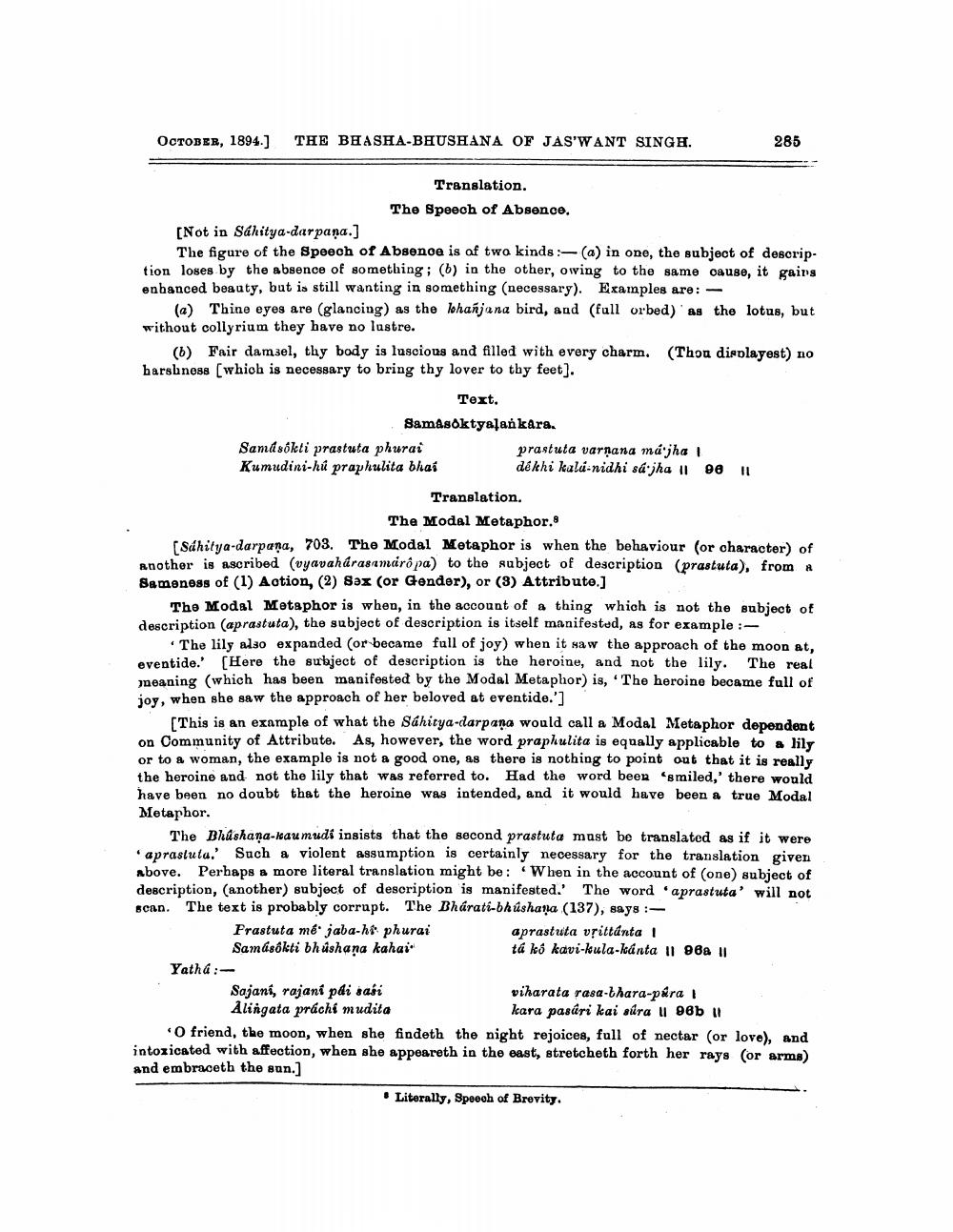________________
OCTOBER, 1894.)
THE BHASHA-BHUSHANA OF JAS'WANT SINGH.
285
Translation.
The Speech of Absence. [Not in Sahitya-dar paņa.]
The figure of the Speech of Absenoe is of two kinds (a) in one, the subject of description loses by the absence of something; (b) in the other, owing to the same cause, it gains enbanced beauty, but is still wanting in something (necessary). Examples are: -
(a) Thine eyes are (glancing) as the lohahjana bird, and (fall orbed) as the lotus, but without collyrium they have no lustre.
(6) Fair damsel, thy body is luscious and filled with every charm. (Thon displayest) no harshness (which is necessary to bring thy lover to thy feet).
Text.
Samasoktyalankara. Samdsókti prastuta phurai
prastuta varnana májha ! Kumudini-hú praphulita bhai
dé khi kalu-nidhi sá jha ll 90 TL Translation.
The Modal Metaphor. Sahitya-darpana, 703. The Modal Metaphor is when the behaviour (or character) of another is ascribed (vyavaharasamdropa) to the subject of description (prastuta), from a Samonoss of (1) Action, (2) Səx (or Gender), or (3) Attributo.)
The Modal Metaphor is when, in the account of a thing which is not the subject of description (aprastuta), the subject of description is itself manifested, as for example :
The lily also expanded (or became full of joy) when it saw the approach of the moon at, ventide. Here the subject of description is the heroine, and not the lily. The real ineaning (which has been manifested by the Modal Metaphor) is, 'The heroine became full of joy, when she saw the approach of her beloved at eventide.')
This is an example of what the Sáhitya-darpana would call a Modal Metaphor dependent on Community of Attribute. As, however, the word praphulita is equally applicable to a lily or to a woman, the example is not a good one, as there is nothing to point out that it is really the heroine and not the lily that was referred to. Had the word been 'smiled,' there would have been no doubt that the heroine was intended, and it would have been a true Modal Metaphor.
The Bhashana-waumudi insists that the second prastuta must be translated as if it were aprastuta.' Such a violent assumption is certainly necessary for the translation given above. Perhaps a more literal translation might be : "When in the account of (one) subject of description, (another) subject of description is manifested. The word "aprastuta' will not scan. The text is probably corrupt. The Bhárati-bhúshana (137), says: Prastuta mé jaba-hi phurai
aprastuta vșittánta! Samásôkti bhúshana kahai"
tá ks kavi-kula-kánta | 982 | Yatha :Sajani, rajani pdi sasi
viharata rasa-thara-pára! Alingata prachi mudita
kara pasári kai aura li 96b 11 O friend, the moon, when she findeth the night rejoices, full of nectar (or love), and intoxicated with affection, when she appeareth in the east, stretcheth forth her rays (or arms) and embraceth the sun.]
• Literally, Speech of Brevity.




